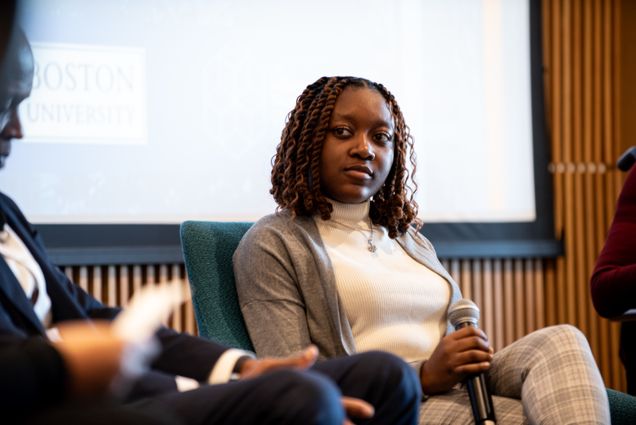
Brianna Bourne (CAS’24) grew up in Mattapan, a neighborhood in Boston, surrounded by Caribbean culture. Upon her arrival at Boston University, her interest in mental health issues led her to declare a major in psychology. Then from a Latin minor, she switched to Classical Civilization major because of her prior exposure to Greek culture, mythology and Roman history.
On campus, she reactivated Students of Caribbean Ancestry (SOCA), a student organization that encourages students to embrace the vibrant cultures of the Caribbean, including music, dance, and cuisine. The organization had become inactive during the COVID-19 pandemic. Since reactivating the club, Bourne says the organization has helped her reflect on the diverse backgrounds of the neighborhood where she grew up.
After graduation, Bourne plans to pursue a master’s degree in Mental Health Counseling & Behavioral Medicine at the Boston University Chobanian and Avedisian School of Medicine, with hopes to become a psychologist or therapist.
Arts & Sciences caught up with Bourne, who is majoring in psychology and classical civilization and minoring in emotional & behavioral challenges in schools at Wheelock College of Education & Human Development.
Arts & Sciences: What’s your favorite class in the Classical Civilization Department?
Bourne: I would say my favorite class was CL 229, “Roman Comedy.” We got to look at Roman comedy—that’s something I never even thought about that they would do comedy in the ancient world—but also the fact that we related it to the modern world as well. And we were able to create our own play and even perform it. We came together as a class and made a script. We started off the class every time asking, “Who has a joke?” and that was a very fun way to start a class. Professor Sophie Klein was amazing, and I felt more intimate with the professors. Compared to my psychology major, the classics department is a lot smaller. So I really enjoyed having smaller classes.
Can you tell us more about Students of Caribbean Ancestry?
I was president for a year. When I came to campus, the club was deactivated because of COVID. So I went to the Student Activities Office, asked them, “Can I revive this?” So now as a senior, I’m the Senior Advisor. For me, there’s that community and family [between club members] and you’re always working hard together. As a cultural club, it’s about seeing how people embrace their culture, even if it’s multiple identities—just like in the Caribbean. I feel like that’s something very heartwarming to see—how people get excited to come together and just do anything like play games and eat food.
What made you want to reactivate the club?
It’s both my family background, as well as my personal interests. I’m from a part of Boston called Mattapan. It’s heavily a Caribbean community, especially the Haitian community. Even though I’m Jamaican, just being in my high school and middle school, I saw a lot of Caribbean culture. Then coming to BU, I wondered where the cultural representation for the Caribbean community was, especially since I’m still in the same city. I think that was because there wasn’t a space on campus for Caribbean students to come together. It was definitely hard to do it because I was very shy at the time. But my friend, who founded the Nigerian Student Association, encouraged me to post a query on Instagram, to gauge student interest, and soon it had 300 followers. So after months of planning, SOCA relaunched in 2022.
What’s something that SOCA plans to do in the future?
Something that we like to still do more is collaborations with other Caribbean communities around Boston, Massachusetts, and the New England area. The Caribbean identity at BU can be different from the Caribbean community at Tufts. So I think there will be more collaborations outside BU. Also I want to see more collaborations with BU cultural clubs, like the African Student Association, Black Student Union, Asian Student Union. It will be cool to find those shared identities and come together to celebrate them in one space.
You also work at the Boston University Newbury Center for First Generation students?
Yes. I’m a first generation student. I work there because I wanted to embrace that first-gen experience and even my identity while helping others. I feel like that’s something that I also feel like is important to me. I’m always trying to find ways on campus to learn more about my identity, but also see how other people navigate the identity in their own way.
Interview by Haiyi Bi (COM’25)